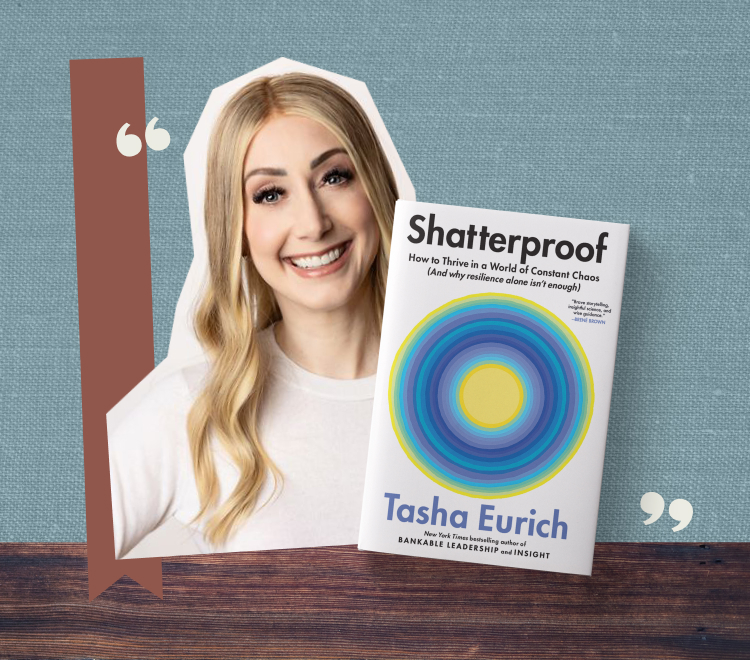Why the ABK Team loves this book:
It turns out Friedrich Nietzsche and Kelly Clarkson weren’t 100% accurate when they said what doesn’t kill us makes us stronger.
As Dr. Tasha Eurich explains in Shatterproof: How to Thrive in a World of Constant Chaos (And Why Resilience Alone Isn’t Enough), resilience might get us through setbacks, but it doesn’t necessarily mean we come out the other side better and stronger than before. To transform setbacks into growth and thriving, she offers another set of skills that includes accepting the broken parts of ourselves, recognizing our unmet needs, responding to stressors, and strategically pivoting to creatively meet those needs. Owning our emotions and building confidence, choice, and connection can make us stronger than ever.
In addition to presenting compelling research, Dr. Eurich is deeply vulnerable about how her own shatterproof journey to find answers for her chronic illness has been shaped and formed by her research and findings.
Our three favorite quotes from the book:
“People who are strengthened by adversity don’t try to conceal their cracks with a ‘powering through’ mindset or by denying their broken parts. Instead, they harness them to become more beautiful than before. Becoming shatterproof, at a fundamental level, means harnessing the broken parts of ourselves to access the best version of ourselves.”
“Finding the courage to emerge from the darkness is exactly what living a shatterproof life is all about. Because without heartbreak, we cannot feel joy. Without failure, we can’t know success. And without tragedy, we cannot find transcendence.”
“Whatever challenges we face, the solution is not to suffer in silence, barely holding on and keeping it together — it’s to stare our pain in the face and fight, fight, fight for the dazzling life that lies ahead of us.”
Three questions for the author:
Why do you think the myth that resilience makes us better and stronger has been so persistent?
Because enduring feels heroic. But after five years of research — and walking through my own wreckage — I found a different pattern. Resilience means bouncing back, but it leaves us brittle. This myth plays to our deepest fear: that strength means being unaffected. That struggle only counts if we get tougher. But grit without grace doesn’t make us stronger — it turns us into stone . . . or shatters us completely.
What role does self-compassion play in becoming shatterproof and coming back stronger from setbacks?
Where resilience gets us through, becoming shatterproof means letting our pain reveal what we truly need. For years, I believed self-sacrifice was strength, but it kept me stuck. Self-compassion was the turning point. When we say, “Of course I’m struggling — this is hard!” we create space for insight, growth, and healing. It’s not about letting ourselves off the hook; it’s about letting our best selves back in.
What is a strategic shatterproof experiment you are conducting in your own life right now?
I’m learning to stop performing and start receiving care, from myself first. For years, I was the overfunctioning fixer. Then came The Season I Couldn’t Power Through. When my body — and my heart — said no, I started asking: ‘How can I stop outsourcing my safety and start giving myself what I need?’ The uncomfortable-but-enlightening truth? Real strength isn’t how much you hold — it’s learning how to hold yourself.

